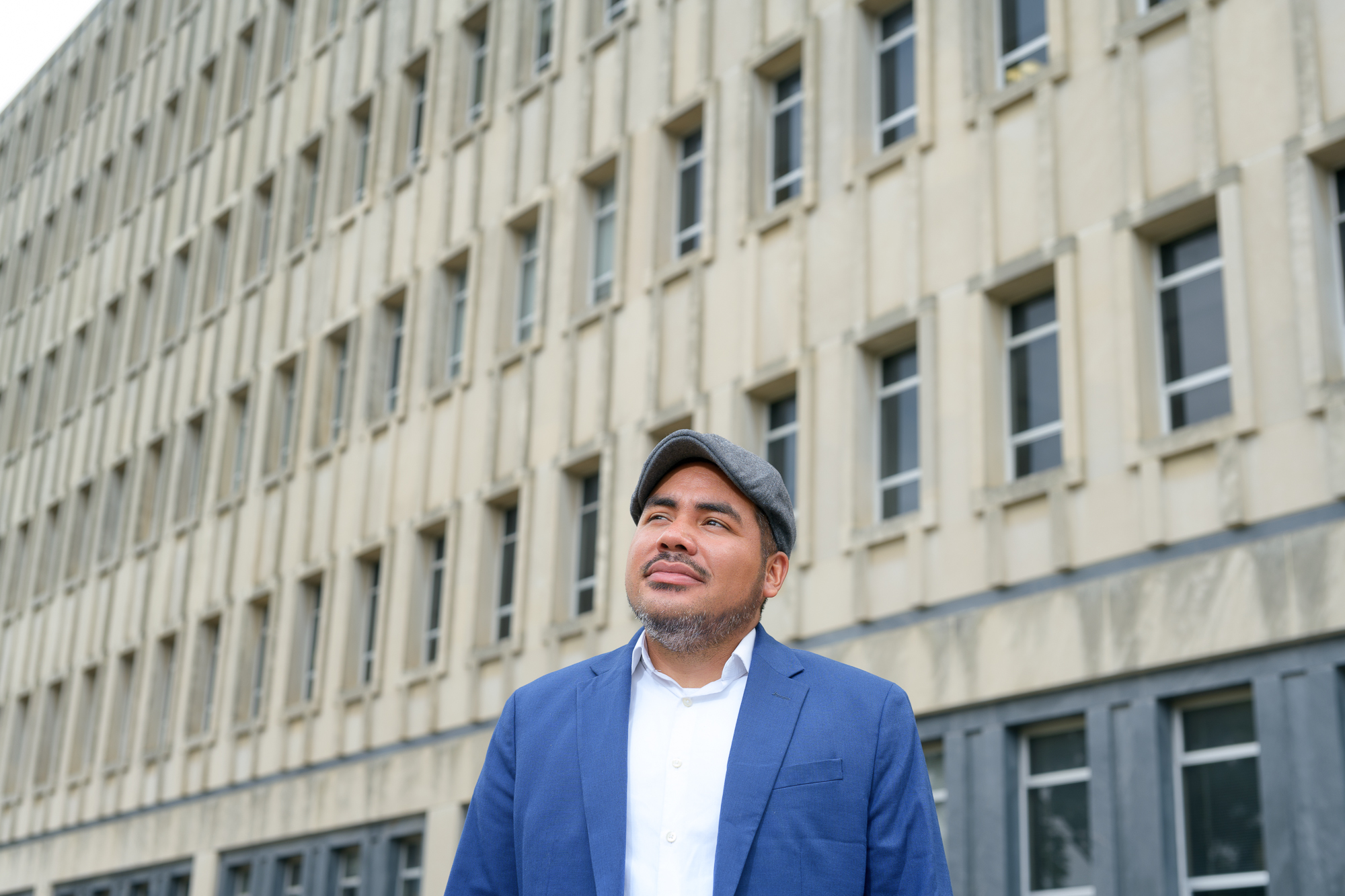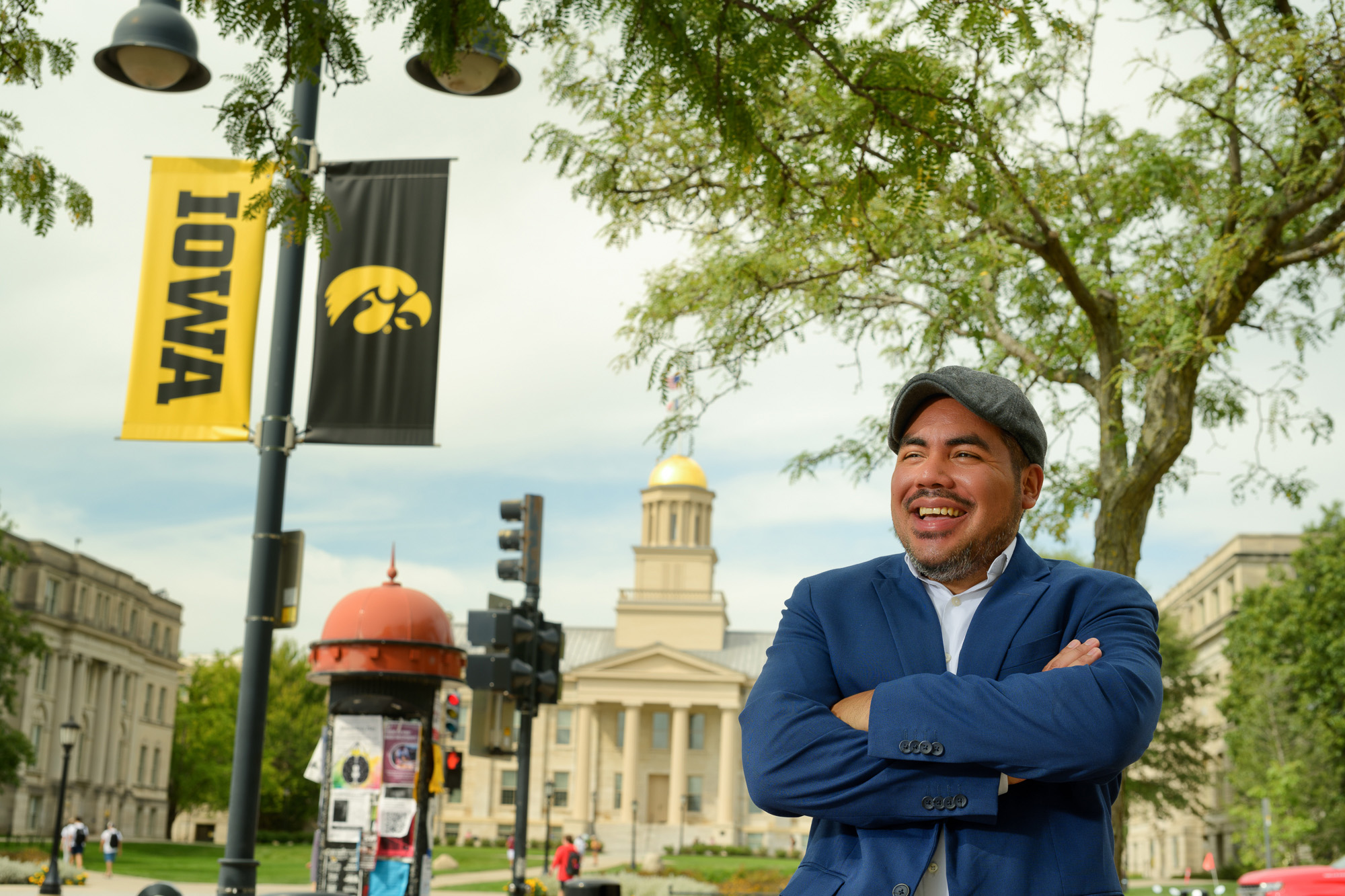Witnessing the future—and feeling optimistic

Common media portrayals of college students aren’t always very favorable.
But Jorge Guerra says he leaves his classes and other interactions with University of Iowa students feeling optimistic about the future.
“You always hear negative things about today’s college students,” says Guerra, lecturer in the Latina/o/x Studies Program and the Magid Center for Undergraduate Writing. “But I don’t see that in my students. They are sweet and respectful and generous. They are here to learn. They are here to ask questions. They are here to be critical thinkers. And it’s beautiful to see all these students from different backgrounds wanting to be here, wanting to engage with the material, and wanting to gain and use new tools to think about how they can be better community members, better friends, and better advocates of so many issues. It’s wonderful to see and witness.”
Guerra is entering his 10th year at the University of Iowa, spending the first two in the Iowa Writers’ Workshop, where he was a Dean’s Graduate Research Fellow, before joining the university’s faculty.
Iowa City is a long way from where Guerra grew up—both in location and culture.
Guerra was raised in South Central Los Angeles by his mother, who came to the United States from Guatemala in 1980. They were surrounded by extended family, sharing a home with an aunt, uncle, and cousins.
“I grew up in this family atmosphere, and when I walked outside, it was a predominantly Mexican American and Mexican immigrant neighborhood that also was historically African American,” Guerra says. “My family was part of a wave of Central American families who moved there in the 1980s and ’90s.”
As the country celebrates Latinx/a/o Heritage Month, Guerra says he hopes to see the larger American population take Latinx/a/o peoples more seriously every day of the year.
“One of my frustrations living in United States as a Latino is that it seems like people like me and anyone else who looks like me are perceived as if we have no values. We have no complexities. We have no ambitions or no life that we’re striving for. So, we have no humanity really,” Guerra says. “But we’re beautiful, complex human beings who have family and others whom we love dearly, just like everyone else. So, enjoy our food and celebrations, but also knock on our doors to say hi and see how we’re doing.
“We should be celebrating every single day for helping make the United States the country that it is today.”
He didn’t travel far from home for his undergraduate studies, earning a BA in English with an emphasis in creative writing at California State University/Long Beach. English wasn’t his first choice for a major when he started college, however.
He says growing up in Los Angeles, it was hard to avoid the lure of Hollywood, and his initial major was theater arts. But he wasn’t interested in becoming the next big movie star. Film history and film theory were more his passion. But they weren’t his only interests.
“I’m a math nerd. I love math. I love square roots. I love fractions. I love percentages. I love trigonometry,” Guerra says. “Those are my jams even today. But the idea of doing it for the rest of my life as a job sounded horrible.”
Guerra also had a special relationship with books.
“Those spaces were gateways to not only understanding the world I was living in and understanding these characters and places and such, but books were my escapism,” Guerra says. “During this time, I was experiencing really horrible depression, really great mental health issues, and books were my space to essentially go to forget thinking about all of that.”
It was an English professor who encouraged him to think about English and writing as a career.
“He really allowed for creativity to flourish in our classroom and he thought my imagination was explosive and colorful,” Guerra says. “I was a little resistant at first because I was worried how to make money out of it. But I decided to jump in and I really loved it.”
His instructors also urged him to apply to graduate school, particularly the Iowa Writers’ Workshop.
“I thought it was wishful thinking,” Guerra says.
But then he got a call from Lan Samantha Chang, director of the workshop, welcoming him to the program.
“I was yelling and crying and screaming on the quiet floor of the library,” Guerra says. “People were staring and scolding me. But when I told them what happened, everyone clapped.”
Telling his mother the good news was a bit harder.
“The first question she asked when I said I got into graduate school was, ‘Is this at Long Beach?’” Guerra says. “I said ‘No, it’s not nearby.’ She said, ‘Is it in California?’ I said, ‘We need to sit down and talk.’”

“I love when students ask questions and bring up provocative points that as an instructor I’ve never thought about. Their observations can be spot on, and it’s just so brilliant to listen to them and navigate those conversations.”
Guerra says Iowa City has offered him a sense of independence he had never had growing up in a large close extended family. After 10 years, he says he still feels out of place at times, but he says Iowa City is a wonderful place to meet good people who are passionate about a host of topics that are important to him.
“I’m really grateful for the work that I do here and also very grateful for the people I work with who are so encouraging,” Guerra says.
And that includes his students. Over the years, Guerra has taught courses on queer Latina/o/x studies, Latina/o/x film, and Latinx immigration literature. He’s also an active member of the UI Latinx Council and serves as a mentor for the Storm Lake Scholars Program.
Guerra says he’s continually impressed by his students.
“I love when they ask questions and bring up provocative points that as an instructor I’ve never thought about,” Guerra says. “Their observations can be spot on, and it’s just so brilliant to listen to them and navigate those conversations. We end up laughing, gossiping, being sad, and crying. We go through a range of emotions because that’s what we have to unpack in my classroom and talking about ethnic studies.”
The Latina/o Studies minor offers an interdisciplinary perspective on the history, culture, politics, and experiences of Latinas/os/x in the United States. Latinas/os/x are now the largest minority group in the U.S., and by the year 2050 it is expected that approximately one third of the U.S. population will be Latina/o/x. Latina/o/x Studies courses introduce peoples that have a long-term presence in the U.S. and in the Midwest, and who are increasingly neighbors, classmates, and coworkers. The Latina/o/x Studies minor helps to prepare undergraduates for careers in medicine, public health, social work, business, education, and the arts, and to respond to the changing demographics of the U.S.
The Latina/o/x studies minor was first offered in 2015, and Guerra says he has enjoyed seeing it grow, and his students’ growth along with it.
“The Latina/Latino/Latinx students often think of these classes as a place where they can learn about themselves and their history,” Guerra says. “They also want to have a better understanding of not only their culture, but also their friends’, who might be Mexican or Guatemalan or Puerto Rican.”
He says many white students tell him they want to learn about history and cultures they didn’t learn about in high school. Guerra says it’s been especially wonderful when students sign up for a Latina/o/x studies class because one of their friends recommended it.
“One of the things that makes me proud is that they just want to be better community members,” Guerra says. “They want to be able to enter spaces that are owned or occupied by Latinos—whether they are born in the United States or are immigrants—and have a sense of the etiquette and cultural expectations and not be disrespectful.”
Guerra also over the past decade has seen firsthand an evolution of the Latino Native American Cultural Center (LNACC), which celebrates 50 years this year.
When he arrived as an Iowa Writers’ Workshop student, Guerra would go to the LNACC to study because there were few people there and lots of empty rooms. But today, there are always people coming and going.
Guerra says he now acts as a support system for the students at the center, giving talks on various topics and just being there for students to talk to about anything.
“It really beautiful to see it thriving,” Guerra says. “It’s phenomenal to be a witness to its growth but also the larger benefit of why those houses are there in the first place.”